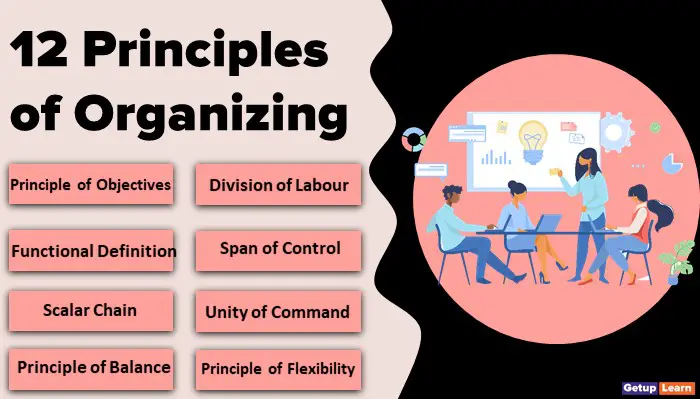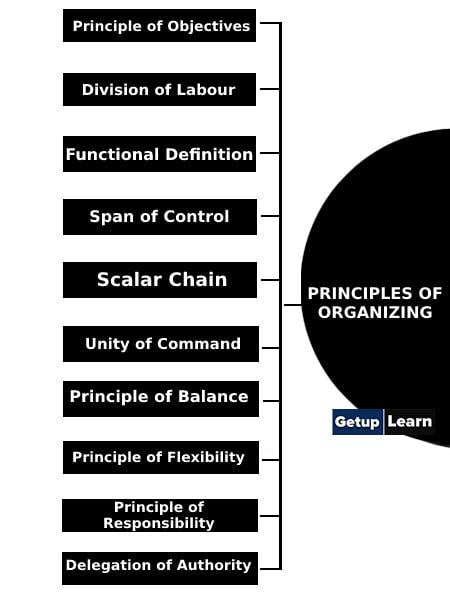
Table of Contents
-
1 Principles of Organizing
- 1.1 Principle of Objectives
- 1.2 Division of Labour
- 1.3 Functional Definition
- 1.4 Span of Control
- 1.5 Scalar Chain
- 1.6 Unity of Command
- 1.7 Principle of Balance
- 1.8 Principle of Flexibility
- 1.9 Principle of Responsibility
- 1.10 Delegation of Authority
- 1.11 Principle of Exception
- 1.12 Principle of Simplicity
- 2 FAQ Related to Principles of Organizing
Principles of Organizing
Organizing is an important function of management. The success of any management depends on the success of the organization. The organization works as a structure of men and resources as well as an executive function.
It works for the attainment of common objectives. There should be some guidelines or rules necessary when the work is group work. Such rules are called principles of organizing.
As organizing is a group activity it also needs principles. E. L. F. Brach explained the importance of principles of organization for establishing a strong organizational structure. The following are some of the important principles of organization:
- Principle of Objectives
- Division of Labour
- Functional Definition
- Span of Control
- Scalar Chain
- Unity of Command
- Principle of Balance
- Principle of Flexibility
- Principle of Responsibility
- Delegation of Authority
- Principle of Exception
- Principle of Simplicity

Principle of Objectives
This principle is related to understanding the objectives of the enterprise. Objectives are determined by top management. So it is necessary to take review objectives and policies.
By knowing the exact objectives, it is possible to establish the exact structure of the organization. The objectives are to be explained to the people involved in the organization.
According to this principle, the organization and every part of it should be directed toward the achievement of predetermined objectives.
Division of Labour
According to this principle the total work in the organization should be divided into small tasks and jobs and each job should be assigned to an individual so that over a period of time he will specialize in that job.
Thus it encourages specialization of work. It should be applied to the work performed by employees as well as by managers. However, over-specialization should be avoided. Further, it should be ensured that jobs will not become monotonous and boring.
Functional Definition
This principle explains that the functions to be performed by an individual or department should be well defined.
The duties and authority relationships of various individuals in the organization should also be clearly defined to avoid overlapping and duplication of work. Further, the results expected of each individual should be clearly stated.
Span of Control
According to this principle, no executive should be required to supervise ‘more subordinates than warranted by his/her, capacity.
It refers to the number of subordinates working under each superior. It recognizes that no superior can control effectively a large number of sub-ordinates.
Scalar Chain
As per this principle, there should be an unbroken line of authority or scalar chain from the top to the lowest level. As far as possible this chain should be short. It defines the superior and subordinate relationships among the individuals in the organization.
A clearly defined scalar chain leads to more effective decision-making and improved organizational communication.
Unity of Command
According to this principle, each individual should receive orders from only one superior and be accountable to him for the work. Unity of command implies the single source of authority over a subordinate.
It reduces the chances of conflict, helps to maintain discipline, creates a feeling of personal responsibility, removes uncertainty, and prevents divided loyalty among employees.
Principle of Balance
There should be a balance between the various parts of an organization and no function should be given under-emphasis at the cost of other functions.
For creating structural balance it is necessary to maintain a balance between line and staff authority between centralization and decentralization and between the span of control and lines of communications.
Principle of Flexibility
According to this principle, the organizational structure should be flexible in nature. It should be designed to permit the growth and diversification of activities. It should permit quick and easy adaptation of the organization to the changing environment.
Principle of Responsibility
This principle clears that corresponding responsibilities are clearly determined for each job. Determinations of responsibility help an employee to use his authority more cautiously and carefully.
Fixation of responsibility makes him more aware of his performance. The Quantum of responsibility shall correspond with the quantum of authority. Otherwise, it may affect his performance adversely.
According to this principle authority delegated to an individual should be inconsistent with the responsibility. It should be adequate to enable the individual to accomplish the results expected of him. At the same time, proper control should be exercised over each individual.
Principle of Exception
According to this principle, each should take all decisions within the scope of his/her authority and only those matters which are beyond his/her scope of authority should be referred to higher-level managers.
The matters of the routine decision should not be referred to the top management. The top management should look into only exceptional matters.
Principle of Simplicity
This principle explains that the organization should be simple. The organization should be so structured that everyone can understand it easily. There may be minimum levels in the organization.
What are the principles of organizing?
The following are the principles of organizing:
1. Principle of Objectives
2. Division of Labour
3. Functional Definition
4. Span of Control
5. Scalar Chain
6. Unity of Command
7. Principle of Balance
8. Principle of Flexibility
9. Principle of Responsibility
10. Delegation of Authority
11. Principle of Exception
12. Principle of Simplicity.



















